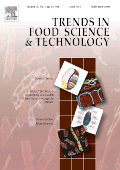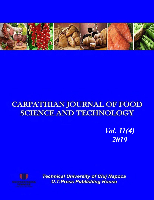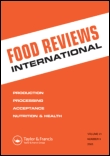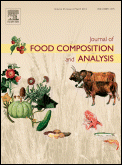
Food Chemistry-X
Scope & Guideline
Exploring the Molecular Wonders of Food.
Introduction
Aims and Scopes
- Food Chemistry and Biochemistry:
Research involving the chemical composition of food and its biochemistry, including studies on metabolites, phytochemicals, and their interactions during food processing. - Food Quality and Safety Assessment:
Investigations into the quality attributes of food products, including sensory analysis, nutritional profiling, and the impact of processing on food safety. - Innovative Food Processing Techniques:
Exploration of novel food processing methods, such as non-thermal technologies, fermentation processes, and sustainable extraction techniques aimed at enhancing food quality. - Health Benefits and Functional Foods:
Studies that evaluate the health-promoting properties of food components, including the bioactivity of natural compounds and their potential applications in nutraceuticals. - Food Authentication and Traceability:
Research focusing on the methodologies for authenticating food products, including the use of advanced analytical techniques for origin tracing and contamination detection.
Trending and Emerging
- Sustainable Food Processing:
There is a growing emphasis on sustainable practices in food processing, including the use of green extraction methods and minimizing waste. - Functional Foods and Bioactive Compounds:
Research focusing on the identification and application of bioactive compounds in foods that promote health benefits is increasingly prevalent. - Advanced Analytical Techniques:
The integration of cutting-edge technologies such as metabolomics, proteomics, and machine learning in food analysis is gaining momentum, with researchers exploring complex food matrices. - Food Safety and Contaminant Detection:
Emerging techniques for rapid detection of contaminants and foodborne pathogens are becoming a critical area of research, driven by consumer safety concerns. - Microbial Fermentation and Flavor Development:
The exploration of microbial fermentation processes to enhance flavor profiles and health benefits of food products is increasingly recognized as a vital area of study.
Declining or Waning
- Traditional Food Preservation Techniques:
Research on conventional food preservation methods, such as salting and smoking, has decreased as newer, more efficient techniques gain attention. - Basic Nutritional Studies:
While foundational nutritional research remains important, there has been a shift towards applied research that focuses on functional foods and their health benefits. - Single Component Analysis:
The trend is moving towards studying complex interactions within foods rather than isolating single components, leading to less emphasis on basic compositional analyses.
Similar Journals

Journal of Food and Nutrition Research
Elevating Standards in Food and Nutrition ResearchJournal of Food and Nutrition Research, published by the VUP FOOD RESEARCH INST in Bratislava, Slovakia, serves as a vital platform for disseminating cutting-edge research in the fields of food science and nutrition. With an ISSN of 1336-8672 and an E-ISSN of 1338-4260, this journal emphasizes the importance of interdisciplinary approaches to address contemporary challenges related to food quality, dietary practices, and nutritional health. Notably recognized in the 2023 Scopus rankings, the journal is classified in Q3 quartiles for both Food Science and Nutrition & Dietetics, providing a forum for researchers aiming to enhance knowledge and practices within these domains. Those engaged in academia and industry will find the journal invaluable for its comprehensive scope, which covers novel food technologies, nutrition interventions, and the implications of dietary behaviors. Though not open access, the journal is dedicated to enriching the academic conversation and contributing to advancements in public health and nutrition policies.

TRENDS IN FOOD SCIENCE & TECHNOLOGY
Exploring the forefront of food science and technology.Trends in Food Science & Technology, published by Elsevier Science London, stands as a premier journal in the fields of food science and biotechnology. With an impressive Q1 ranking in both the food science and biotechnology categories, it is recognized for its rigorous peer-reviewed articles that advance knowledge and innovation in the sector. The journal’s Scopus rankings validate its significance, placing it in the top percentile among its peers, with a remarkable rank of #2 out of 389 in Agricultural and Biological Sciences - Food Science, and #4 out of 311 in Biochemistry, Genetics, and Molecular Biology - Biotechnology. Since its inception in 1990, the journal has become a vital resource for researchers, professionals, and students alike, offering insights into contemporary challenges and trends impacting food technology. Although it operates under a subscription model, the quality of research published within its pages makes it an essential read for anyone involved in advancing the science of food.

Carpathian Journal of Food Science and Technology
Pioneering Research in the Heart of Romania's Food ScienceCarpathian Journal of Food Science and Technology, a distinguished publication from the NORTH UNIV CENTER BAIA MARE, has been a pivotal platform for disseminating groundbreaking research in the field of food science since its inception in 2009. With an ISSN of 2066-6845 and an E-ISSN of 2344-5459, this Open Access journal aims to promote knowledge and innovation, offering unrestricted access to its content, thereby enhancing visibility for authors and facilitating a wider readership. Based in Romania, the journal plays a crucial role in advancing scientific inquiry within the agricultural and biological sciences, particularly focusing on contemporary food science issues. As it continues its convergence through 2024, the journal currently holds a Q4 ranking in the Food Science category, allowing it to carve out a unique niche within the academic community despite its current Scopus percentile ranking of 19th. Scholars, researchers, and students in the field will find the journal an invaluable resource for the latest advancements and discussions, making it an essential addition to their academic pursuits.

Applied Food Research
Connecting Knowledge to Global Health and Well-BeingApplied Food Research, published by Elsevier, is an esteemed journal that plays a critical role in advancing the field of Food Science. With an ISSN of 2772-5022, the journal has established itself as a premier outlet for high-quality research, achieving a commendable Q1 ranking in the 2023 Food Science category and a 63rd percentile in Scopus rankings for Agricultural and Biological Sciences. Covering a diverse range of topics from food safety to innovative processing techniques, Applied Food Research seeks to publish pioneering studies that enhance our understanding of food systems and contribute to broader discussions on sustainability and nutrition. As it converges on its fourth year of publication, researchers, professionals, and students alike are encouraged to engage with its content through various open access options, ensuring widespread dissemination of knowledge in a field that is vital to global health and well-being. Operating out of Amsterdam, Netherlands, this journal is poised to be an indispensable resource for anyone dedicated to making significant contributions in the domain of food science.

Food Chemistry: Molecular Sciences
Pioneering Research for a Healthier TomorrowFood Chemistry: Molecular Sciences is a leading academic journal published by ELSEVIER, dedicated to advancing knowledge in the fields of food science and molecular biology. With an ISSN of 2666-5662, this journal is a key platform for researchers and professionals aiming to disseminate innovative research findings from 2020 through 2024. Recognized for its quality, it stands in the Q1 category for Food Science and Q2 for Molecular Biology as of 2023, showcasing its commitment to high-impact publications. The journal is indexed in Scopus, earning ranks of #98/389 (74th percentile) in Agricultural and Biological Sciences - Food Science and #214/410 (47th percentile) in Biochemistry, Genetics and Molecular Biology - Molecular Biology. Each article represents cutting-edge research that drives the understanding and application of molecular principles in food chemistry, making it an essential resource for anyone involved in the field. Although this journal does not offer open access, its rigorous peer-review process ensures that the content is reliable and of significant academic value, contributing profoundly to the body of knowledge in the respective disciplines. Located in Amsterdam, Netherlands, Food Chemistry: Molecular Sciences continues to inspire scholarly discussion and innovation within the scientific community.

FOOD REVIEWS INTERNATIONAL
Transforming Research into Practical Solutions for the Food IndustryFOOD REVIEWS INTERNATIONAL, published by Taylor & Francis Inc, serves as a pivotal resource within the fields of Food Science and Chemical Engineering. Established in 1985, this esteemed journal offers a comprehensive platform for the dissemination of critical reviews that enhance understanding and innovation in the food industry. With an impressive impact factor reflecting its Q1 quartiles in both Food Science and Chemical Engineering categories, it ranks among the top journals in Scopus, securing the 24th spot in Agricultural and Biological Sciences. Scholars, researchers, and professionals are encouraged to explore its rich content, which spans meticulously reviewed articles that bridge academic research and practical applications, while contributing to advancements in food safety, processing, and sustainability. Although not an Open Access journal, access to its extensive repository is vital for anyone aiming to stay at the forefront of food science advancements.

Ukrainian Food Journal
Advancing food science through innovative research.Ukrainian Food Journal is an esteemed open-access journal dedicated to advancing the field of food science and biochemistry. Established in 2012 and published by the National University of Food Technologies in Ukraine, the journal serves as a vital platform for researchers and professionals to disseminate their findings on food technology, safety, and nutritional biochemistry. With an ISSN of 2304-974X and E-ISSN 2313-5891, it offers a wealth of knowledge to its readers, promoting innovation and collaboration within the industry. While currently categorized within the Q4 quartile of biochemistry and the Q3 quartile of food science, the journal is progressively gaining recognition, reflecting a commitment to quality research in a competitive field. The journal is indexed in Scopus, ranking #271 in Food Science and #376 in Biochemistry, underscoring its relevance and contribution to agricultural and biological sciences. The Ukrainian Food Journal not only enriches the academic community with its open-access model but also aims to foster dialogue among researchers, professionals, and students dedicated to improving food systems and nutrition. It operates from its headquarters in Kyiv, offering a hub for creativity and advancement in food-related research.

ITALIAN JOURNAL OF FOOD SCIENCE
Bridging Tradition and Innovation in Food ScienceITALIAN JOURNAL OF FOOD SCIENCE is a distinguished open-access publication dedicated to advancing knowledge in the field of food science, catering to a global audience of researchers, professionals, and students. Published by Codon Publications in Singapore, this journal, operating under the ISSN 1120-1770 and E-ISSN 2239-5687, has been a vital platform for scholarly discourse since its inception in 1996, converging towards a comprehensive view of food science trends through 2024. With an impressive ranking in the third quartile (Q3) of the Food Science category and a Scopus rank of #151 out of 389, the journal plays a significant role in disseminating high-quality research, contributing to a richer understanding of food science within the agricultural and biological sciences. Since transitioning to open access in 2008, it has further expanded its reach, ensuring that innovative research is accessible to all, thereby fostering collaboration and knowledge exchange in this vital industry.

International Food Research Journal
Transforming Ideas into Impactful Food ResearchThe International Food Research Journal, published by UNIV PUTRA MALAYSIA PRESS, serves as a pivotal platform for disseminating innovative research within the field of food science. With an ISSN of 1985-4668 and an E-ISSN of 2231-7546, the journal has successfully established its presence since its inception in 2007, converging its findings through 2024. This esteemed journal holds a Q3 ranking in Food Science, illustrating its valuable contributions to the field as demonstrated by its Scopus rank of 276 out of 389, placing it in the 29th percentile among its peers in Agricultural and Biological Sciences. Although it operates under a traditional publishing model, its academic integrity and focus on high-quality research ensure that it remains a vital resource for researchers, professionals, and students eager to explore advances in food technology, nutrition, and safety. By encouraging interdisciplinary collaboration and critical dialogue, the International Food Research Journal plays an essential role in shaping the future of food science research.

JOURNAL OF FOOD COMPOSITION AND ANALYSIS
Leading the Charge in Food Quality ResearchJOURNAL OF FOOD COMPOSITION AND ANALYSIS, published by Academic Press Inc. Elsevier Science, is a leading peer-reviewed journal in the field of Food Science, recognized for its substantial impact on advancing research and knowledge within the discipline. With a commendable Q1 quartile ranking in the 2023 category of Food Science and a Scopus rank of 86/389, this journal holds a prestigious position, emphasizing its significance in crop and food quality research. The journal's scope encompasses a wide range of studies related to food composition, nutrition, and analytical methodologies, aiming to foster innovation and knowledge dissemination in food science. Although it operates under a subscription model, it remains an essential resource for researchers, professionals, and students seeking credible and cutting-edge findings. Established in 1987, the JOURNAL OF FOOD COMPOSITION AND ANALYSIS continues to be at the forefront of food science, contributing to the understanding of food quality and nutrition standards globally.